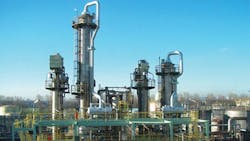Oxea Completes Specialty Esters Plant in China
Chemical company Oxea announced earlier this week that its specialty esters plant in Nanjing, China, is now mechanically complete.
The new plant is Oxea’s first production site in Asia. It will complement Oxea’s three existing specialty esters plants in Europe and will boost Oxea’s global production capacity for specialty esters by 40%.
Specialty esters are used to manufacture a large variety of industrial products for, among others, the automotive, architectural and medical sectors.
After a construction period of slightly more than fifteen months the new state-of-the-art plant is currently in the commissioning and start-up phase.
“In view of rising customer demand, it is important to note that here in Nanjing we will have sufficient space and infrastructure to implement further expansions, also for other product lines,” said Miguel Mantas, Oxea’s executive board member and globally responsible for Oxea’s commercial activities.
Dr. Horst Hanke, Vice President Engineering and Infrastructure of Oxea, emphasized that the mechanical completion of the specialty esters plant in Nanjing was a major accomplishment for Oxea. "We successfully implemented our advanced proprietary technology in the new site. The excellent cooperation between Oxea’s project teams in Germany and China has been the key driver to achieving this milestone for this world-class production plant," said Hanke.
“Our new plant is ideally located at the Nanjing Chemical Industry Park, an important chemical industry base in China,” said Joe Zou, managing director of Oxea China Ltd. “Situated at the Yangtze River, the premises offer an existing base of large chemical companies, excellent infrastructure and access to well-educated human resources."
Oxea, which is owned by Oman Oil Co. S.A.O.C., is a global manufacturer of oxo intermediates and oxo derivatives, such as alcohols, polyols, carboxylic acids, specialty esters, and amines. These products are used for the production of coatings, lubricants, cosmetics and pharmaceutical products, flavorings and fragrances, printing inks and plastics.
